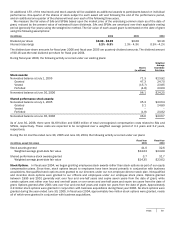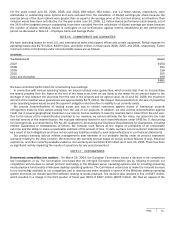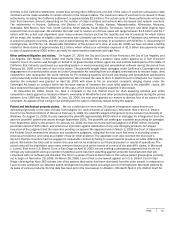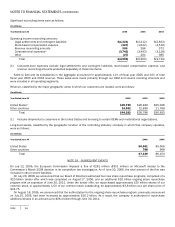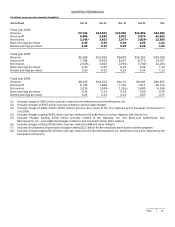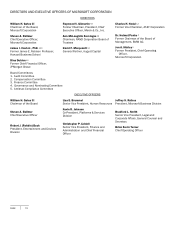Microsoft 2006 Annual Report Download - page 69
Download and view the complete annual report
Please find page 69 of the 2006 Microsoft annual report below. You can navigate through the pages in the report by either clicking on the pages listed below, or by using the keyword search tool below to find specific information within the annual report.
PAGE 68
REPORT OF INDEPENDENT REGISTERED PUBLIC ACCOUNTING FIRM
To the Board of Directors and Stockholders of Microsoft Corporation:
We have audited the accompanying consolidated balance sheets of Microsoft Corporation and subsidiaries (the “Company”) as
of June 30, 2006 and 2005, and the related consolidated statements of income, cash flows, and stockholders’ equity for each
of the three years in the period ended June 30, 2006. These financial statements are the responsibility of the Company’s
management. Our responsibility is to express an opinion on these financial statements based on our audits.
We conducted our audits in accordance with the standards of the Public Company Accounting Oversight Board (United
States). Those standards require that we plan and perform the audit to obtain reasonable assurance about whether the
financial statements are free of material misstatement. An audit includes examining, on a test basis, evidence supporting the
amounts and disclosures in the financial statements. An audit also includes assessing the accounting principles used and
significant estimates made by management, as well as evaluating the overall financial statement presentation. We believe that
our audits provide a reasonable basis for our opinion.
In our opinion, such consolidated financial statements present fairly, in all material respects, the financial position of
Microsoft Corporation and subsidiaries as of June 30, 2006 and 2005, and the results of their operations and their cash flows
for each of the three years in the period ended June 30, 2006, in conformity with accounting principles generally accepted in
the United States of America.
We have also audited, in accordance with the standards of the Public Company Accounting Oversight Board (United States),
the effectiveness of the Company’s internal control over financial reporting as of June 30, 2006, based on the criteria
established in Internal Control—Integrated Framework issued by the Committee of Sponsoring Organizations of the Treadway
Commission and our report dated August 22, 2006, expressed an unqualified opinion on management’s assessment of the
effectiveness of the Company’s internal control over financial reporting and an unqualified opinion on the effectiveness of the
Company’s internal control over financial reporting.
/s/ DELOITTE & TOUCHE LLP
Seattle, Washington
August 22, 2006
CHANGES IN AND DISAGREEMENTS WITH ACCOUNTANTS
ON ACCOUNTING AND FINANCIAL DISCLOSURE
Not applicable.
CONTROLS AND PROCEDURES
Under the supervision and with the participation of our management, including the Chief Executive Officer and Chief Financial
Officer, we have evaluated the effectiveness of our disclosure controls and procedures pursuant to Exchange Act Rule 13a-
15(b) as of the end of the period covered by this report. Based on that evaluation, the Chief Executive Officer and Chief
Financial Officer have concluded that these disclosure controls and procedures are effective.
REPORT OF MANAGEMENT ON INTERNAL CONTROL OVER FINANCIAL REPORTING
Our management is responsible for establishing and maintaining adequate internal control over financial reporting for the
company. Internal control over financial reporting is a process to provide reasonable assurance regarding the reliability of our
financial reporting for external purposes in accordance with accounting principles generally accepted in the United States of
America. Internal control over financial reporting includes maintaining records that in reasonable detail accurately and fairly
reflect our transactions; providing reasonable assurance that transactions are recorded as necessary for preparation of our
financial statements; providing reasonable assurance that receipts and expenditures of company assets are made in
accordance with management authorization; and providing reasonable assurance that unauthorized acquisition, use or
disposition of company assets that could have a material effect on our financial statements would be prevented or detected on
a timely basis. Because of its inherent limitations, internal control over financial reporting is not intended to provide absolute
assurance that a misstatement of our financial statements would be prevented or detected.
Management conducted an evaluation of the effectiveness of our internal control over financial reporting based on the
framework in Internal Control – Integrated Framework issued by the Committee of Sponsoring Organizations of the Treadway
Commission. Based on this evaluation, management concluded that the company’s internal control over financial reporting was
effective as of June 30, 2006. There were no changes in our internal control over financial reporting during the quarter ended
June 30, 2006 that have materially affected, or are reasonably likely to materially affect, our internal control over financial
reporting. Deloitte & Touche LLP has audited this assessment of our internal control over financial reporting; their report follows.



